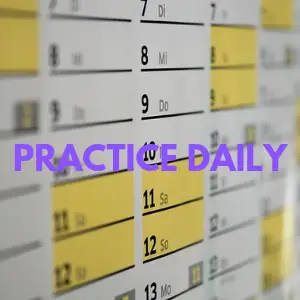This article is dedicated to those who are struggling with singing. In this article, I’m going to introduce you to 20 secret strategies on how to learn singing.
The art of Singing is that you’re born with.
Either you have it, or you don’t.
Right?
Wrong…
Singing is a skill… And just like other skills “it can be mastered”
In my 15 years of music production career, I have listened to that one sentence several times – I wish I could be a better singer, but I can’t. It’s a born talent and I have not been born with it.
I’ve encountered this sentence repeatedly, in my studio by several struggling singers who actually want to become a better singers but they believe that singing is a born talent.
However, it’s not. It’s just a skill, just like other skills and when we repeatedly practice singing, we learn it…within months.
When we first try to sing, it sounds terrible…
And it’s obvious.
Disclosure: This post may contain affiliate links, which means we may receive a commission if you click a link and purchase something that we recommended. Read more about Affiliate disclosure here.
Polishing any skill needs practice. When we first try to sing, it sounds terrible but when we start practicing, it gets better.
But, is it true that practice makes perfect you at signing?
Do you want to know which tools and software I use for music production? Checkout RB Resources.
I saw many “struggling” singers who are practicing for years and unfortunately, I haven’t noticed any major improvement in their singing till today. And the worse case is they can’t even realize it.
But why, what’s the reason that practicing for years can’t help improve their singing?
The reason is…
They don’t know HOW TO LEARN SINGING. They don’t know the right strategies of the practice.
Well, today I’m here to share you with 21 simple strategies to sing better which are used by all professional singers. As soon as you apply these proven strategies in your practicing schedule, you will start to realize how fast you are improving your singing.
So, let’s begin…
Table of Contents
- 1 How to Learn Singing: Basic Strategies
- 2 1. Find Your Singing Style
- 3 2. Develop an Attitude Like Pros
- 4 3. Copy Your Favorite Singer’s Style Not Voice
- 5 4. Recognize Who You Want to Copy
- 6 5. Develop Your Own Voice
- 7 6. Practice Daily
- 8 7. Find an Ideal Singing Practice Spot
- 9 8. Warm-Up Exercises: Do’s and Don’ts
- 10 9. Don’t Read Lyrics: Memorize Them
- 11 10. Take Online Singing Lessons
- 12 How to Learn Singing: Advanced Strategies
- 13 11. Breath Control
- 14 12. Fix Breaks & Cracks
- 15 13. Sing Into a Microphone Oftentimes
- 16 14. Learn to Hear Notes
- 17 15. Learn to Match Those Notes
- 18 16. Hit High Notes
- 19 17. Improve Vocal Range
- 20 18. Get Natural Vibrato In Your Voice
- 21 19. Frequently Add More Songs to Your List
- 22 20. Sing Different Variations of Your Favorite Songs
- 23 Bottom Line
How to Learn Singing: Basic Strategies
For your convenience, I’ve divided this tutorial into two parts.
- Basic strategies – In this part I’ll cover 10 basic strategies that will help you with a Perfect Kickstart.
- Advanced strategies – This part has covered 10 advanced strategies that are applicable to those who are practicing for a long time but not getting any improvement.
1. Find Your Singing Style

Tell me one thing.
How many names do you still remember who participate and even won your favorite music competition show, American Idol?
Maybe 2 or 3, Maybe none.
Why they were easily forgettable? What is the reason- after getting all the praise of the judges and all the cheers of the crowd they were not memorable?
They have all the power, and precision as well as quite confident in themselves. At least, finalists have the minimum standard qualification hence they got the attention of judges and the crowd. Then,
Why they were not memorable?
What’s the missing door?
Okay, now see the opposite ones. Hope you will get the answer.
Those singers you always love to listen to throughout your life, many of whom do not stand out with the American Idol winners in terms of all “technical” standards.
The reason why we love those singers who are terrible by all “technical standards” but always lovable by the world is their “Unique Style”.
It’s true they have come and gone over the decades, you can also be one of them.
Nothing is impossible in this world. The key to success in any field is, do opposite of what the crowd is doing.
And, in singing, it’s the very first and most important step to develop your own style so that you could make a deep impact on the heart of the crowd otherwise you will also be forgotten.
There are two rules for developing your style is,
- It must be that no one ever had before
- And, no one will ever have it again in the future, possibly.
When you observe the “American Idol” singers, you can surely find that – they all sounded more like clones of those legendary singers I mentioned above.
Now here you would be wondering, how do I find my style?
Well, Don’t worry, in the coming sections you will find it. Just be with me.
2. Develop an Attitude Like Pros

When you come on to the stage for your performance as a singer, the one thing that separates you from drummers, guitarists, and bassists is, you literally don’t have anything to hide behind.
When you are on the stage…and open your mouth to sing, the audience will know exactly how you are feeling at that time…
They will see it on your face…in your eyes…in your body language…and in your voice.
A stage is a place where you can’t hide your disability if you don’t honestly feel with 100% certainty.
No matter how perfect you are “technically” if you start with fear in your mind all they will smell of fear easily through your voice. Whatever you say – stage fear, self-doubt, or performance fear, all these are the same. This fear can destroy your singing if you don’t conquer it.
Without having confidence in your signing you are going anywhere from an “average singer’s tag”.
Well, here was the problem but what’s the solution? How do you develop that confidence?
The first step to becoming confident perfectly is, don’t trick yourself to feel confident (false confidence). At least, when you don’t know what are you doing.
There are many examples in singing reality shows like “American Idol or Indian Idol” where participants even winners were self-confident. And lastly, they have been forgotten.
There is another way though – Objective Confidence. Objective confidence is, where you actually know what you are doing. You can develop it by actually getting good at what you’re doing and in our case, singing.
Just remember without getting “objective confidence” you can’t become a good singer.
Great singers conquer their fear by developing “objective confidence” and get the by-product – An attitude
Upcoming sections show you how to develop objective confidence in your singing.
Be with me…
3. Copy Your Favorite Singer’s Style Not Voice

It might sound strange that when I said above, develop your own style and attitude then why I’m favoring copying your favorite singers?
Well, it’s not that “copy-cating” where singers try to make them “clones”.
I want you to copy “their style and attitude” so that with time you would be able to develop your own.
Right?
Without inspiration, we can’t go anywhere. There are tons of examples in history where legends said they had been inspired by their idols. They copied the attitude, the style, and even follow the daily life routine of their idols to transform them into legends.
When you are inspired by your idol and start to act like them in your daily life (not copy-cating) then only then you will find the gold hidden inside you.
Singing is not an exception.
You always be inspired by your favorite singers. Just use this inspiration. Read their Biographies, watch their performances, Listen to them in your practice sessions, observe their style and attitude and start implementing them into you.
When you start observing and implementing their style and attitude and lifestyle which are the core ingredient of becoming successful in singing, you will see the change in your singing just in a few days, and also be ready to find your own ways – to differ from them.
Be with me, I will show you how you can find your own ways, in singing.
4. Recognize Who You Want to Copy
The first task you need to complete is recognizing who you want to copy.
Well, in our life we all listened to many great singers. But we don’t love all of them, however, they all are good even we have a soft corner for some of the singers. We really like to listen to them.
Make a list, of them. And, always remember who you love to listen to means the genre they sing in, is your favorite comfortable genre. You can develop your voice for those genres.
Choosing the right genre is as important as developing your style and attitude. If you choose the wrong genre, it could break your singing career. Every successful singer always stands on a genre that he is comfortable with.
So, make your favorite singer’s list. When you will make your list, start the observing practicing schedule with the list. Try to copy their style of singing, their attitude while performing (Use a mirror while performing), the scale they touch, and other nuances that you observe in them.
In a few days, you will find those with whom you are aligning perfectly. Here you will get a good mix of voices, holding their hand you are going to develop your singing.
Now come to the next strategy which is the most important part of this article. And only this strategy can make you a memorable singer.
5. Develop Your Own Voice

When you have chosen your favorite singers and start to observe them closely, you can find out that they don’t just have a single voice and style but a mixture of 5-6 voices. Some of them have even more.
You would start to notice those,
- The harsh and screaming voice
- Breathy voice
- Soft romantic voice
- Sexy smoky voice
- and more
Different singers have different styles and textures of voices and use them as per the need of the song.
Now what?
Once you’ve got a list of different voices from the different singers, you need to experiment with each of those voices and find out which ones you identify with most.
Assume, you’ve got a list of 5 to 6 singers then you already have more than 30 different voices to practice. Practice with them for some time and you can find out your own version of voices.
Actually finding out your own voice is the main goal of this strategy. Once you find out them, you need to polish them as more as possible.
Here’s how you can polish your version of voices.
6. Practice Daily

Without hardwork nobody gets the fruit.
If you wanna be a great singer, you need to practice daily. There are no shortcuts to hard work.
I’m not saying that you should practice hours and hours on a daily basis but at least give 1 hour daily in your practice. Signing is not a short-term agreement.
It is an ongoing process. I’ve seen many singers who didn’t take “practicing” seriously, and ended with the tag of “ordinary singer”.
And also seen those who continued their practice today. they are at another level.
So, Practice daily.
With said that you need to be aware of some rules of signing practice to get out the maximum benefit.
In the next sections, I will show you how should you practice to become a great singer.
Up first,
7. Find an Ideal Singing Practice Spot

Rule number 1 for the singing practice is – Find the spot where nobody can hear you.
There are two reasons behind this – why should you find an alone place.
The first reason is,
Singing practice is a type meditation.
Maybe you don’t agree with me but singing is one of those ways that unite you with the god(Nature). And you don’t want someone to disturb you while you are practicing. Do you?
When someone practice singing, he is in another state of thought that should not be disturbed by the outer world.
So, you need a spot where nobody comes to disturb you.
Now, let us see the second reason.
Do you want to lose your confidence by making your roommates or neighbors laugh at you?
When you practice you’re going to be wrong many times long before figuring out how to do it right. It’s a normal condition. Right?
the problem arises…
When you practice in a room where your neighbor and roommates can hear you…or even if they don’t hear, you’re slightly self-conscious that they can hear you that’s enough to lose your self-confidence. Remember it’s meditation.
And, if you find only once someone laughing at you…It would be the last practice session. You lose self-confidence and then never try to practice.
Do you know why a huge percentage of singers don’t have power in their voices? Because they don’t have a dedicated alone place for practice and hence can’t give 100% of their energy and focus to practicing.
However, with the course time, when you will develop your voice and confidence, you won’t care what others are thinking about you and then you can practice in normal places too.
Till then, you need that special spot where nobody can hear you.
8. Warm-Up Exercises: Do’s and Don’ts

Vocal cords are one of your body muscles and just like other muscles, they also need to warm up before performing.
There are several methods vocal teachers suggest to warm up your vocal cords.
Such as,
- Starting with some easy and less strainable songs and then going to hard songs
- Scale practice going from low scale to high once
Whatever method you use, make sure don’t stress your vocal cords too much or you would end up with the sore throat.
Caution: Without warming up, applying too much stress can change your tonality by damaging the vocal cords.
So what are do’s and don’ts?
Do’s
- Always start with songs that give less stress to your throat.
- It’s good to practice low notes while warming up.
- Start with low notes and gradually increase the note.
- Always practice in the fresh air.
- Morning time is best for practicing.
Don’ts
- Don’t scream while warming up.
- Practicing high scale at the start is not recommended.
- Don’t drink cold water before the session.
- Don’t try hard songs at the start of the session.
Now you are aware of the do’s and don’ts of warmup exercises, it’s time to jump into some other practicing rules.
9. Don’t Read Lyrics: Memorize Them

There are many singers who sing while reading their lyrics on the sheet in front of them. That’s not good practice.
When a singer sings reading the lyrics, he can’t fully concentrate on the song but is distracted by trying to remember what line is
coming next.
So, I recommend you memorize your lyrics before every performance. By doing this you can give your 100% on the song without distracting by reading the lyrics.
Use lyrics sheet only that condition when you really don’t have the time to memorize.
By memorizing the lyrics you can dedicate your 100% of mental energy to the performance.
Right?
One more thing. Make it your habit by adding the memorizing the lyrics in your practice schedule. It could help you make the process fast.
Now the next one…
10. Take Online Singing Lessons

Warren Buffett said
It’s good to learn from your mistakes but it’s better to learn from other peoples mistakes
What does this quote teach us? Why did Warren Buffett prefer to learn from others’ mistakes?
Here’s why?
Learning from your own mistakes takes time, and in this world time is everything. We don’t have much time to lose it. Right?
So it’s better to learn from other people’s mistakes. By doing this you can make the process really fast. And, the best method of learning from others “these days” is reading books or taking online lessons.
In the old days, we need to go to teachers to learn something but today there are tons of online materials available to learn.
But, taking the right lessons is the most important thing. Otherwise, you will be ending up losing your money on crap.
Well, I have researched and come up with two best singing courses that would definitely help you with mastering the singing.
Now let us dig into some advanced strategies of singing…
How to Learn Singing: Advanced Strategies
In the last ten sections, we encountered the simple strategies that you can use when you are just starting out your singing practice.
Now in the upcoming sections, we will go through more advanced strategies that you can use after you got familiar with the earlier ones.
You need to implement these advanced strategies in your practice schedule for a long time to achieve the goal that you want to. Remember, only these strategies can make you a great singer.
So let’s dig into…
11. Breath Control

Breath control is one of the most important parts of singing. Almost all mediocre singer fails with their inability to control their breathing.
There are numerous breathing mistakes that you can observe in average singers. such as,
- While singing, running out of air at the end of longer phrases.
- Taking small noticeable breaths in between the phrases.
- huffing in between the phrases.
- Can’t control the dynamics of breathing.
The art of breath control is one of those qualities that transform a mediocre singer into a great singer.
While as listeners, many of us don’t realize the singer’s breathing mistakes but we still feel it unconsciously.
And, when people feel mistakes unconsciously they neglect that singer in the future. It’s human nature.
Well, don’t worry. You can improve your breath control by using the methods that I’m going to share with you.
Here’s those…
- Practice notations with long breaths
- Stand on one note as long as possible.
- While singing, be conscious of your breath.
- Try to improve the dynamics of breathing. Keep it as quiet as possible.
- Practice completing phrases in one breath.
While it sounds complicated it’s actually not. When you apply those things in your practice schedule and practice on a daily basis, you can easily improve the art of breath control within a few months.
Now the next one…
12. Fix Breaks & Cracks
When your vocal muscles are weak, breaks and cracks in your voice are common. These cracks and breaks usually happen between the chest and head.
Due to the weak muscles, when you increase your power or range you would break and crack your voice.
Well, there are some exercises to fix this problem.
- In the exercise session, start with low scales and gradually increase the scales.
- First, practice easy songs and then practice hard ones.
- Scale practice is the best for fixing cracks and breaks.
Fixing breaks and cracks is not a one-day process. When your vocal muscles are weak, it takes time to make them stronger. It can be done by continuing strategic exercises on a daily basis.
The next one…
13. Sing Into a Microphone Oftentimes

People when first listen to their voices in speakers they are amazed at the difference in sound. They think of that
Am I sound like this?
Because mics don’t hear you in the way real people hear. And, when you hear your recorded voice, it sounds different from your original voice. Although, this voice is not bad it’s totally different and makes you bother about it.
So, why your voice sounds different in mics?
Let me clear it up.
When you sing or speak the sound travels in a straight line to the listener’s ear, however, some of the sounds enter into the other ears reflecting from other surfaces such as your head.
But when you sing in a mic, it catches the reflected sound along with the direct song. And the amount of reflected sound is quite more than human ears.
This different version of your voice makes you feel bothered and you begin to lose confidence thinking that you are not well in the microphone.
Fortunately, there is one hack to get rid of this problem.
You need to set up a small home studio and begin practicing in mic while recording your own voice and listening to it frequently. By doing this you will become more confident and ready for the stage.
If you don’t know how to set up a home studio within budget here is an article written by me.
Here are some useful articles for vocal recording.
- Recording Vocals in the Studio [Video Tutorial]
- Compressor Settings For Vocals
- Pop Vocal Mixing Tips: Adding Reverb And Delay In Pop Vocals
- Vocal Processing Tips: 8 Proven Methods
- Vocal Recording Techniques Secrets Revealed
Now come to the next section…
14. Learn to Hear Notes
Pitch perception is one of those important things that separate a mediocre and a great singer.
As important pitch perception is as hard to master, at least for singers.
Where keyboardists have keys and guitarists have frets to help them correct their notes, singers literally don’t have anything to support them on stage.
Right?
And, on all this, everybody aspect the singer to be correct in pitch. So it’s really hard work for singers to maintain the perfect notes on the stage.
So what to do when you don’t have any support on stage?
You need to learn to hear the notes. To hear the notes you can deeply listen to the songs before every practice session.
You can also play individual notes and deeply observe them in your mind. These practices make you more conscious of the notes.
But hearing is not enough. You need to match those notes too.
Here’s how…
15. Learn to Match Those Notes

Prepare yourself for it. Master the pitch perception. And, to master it you need support in your practice. You should always learn to play at least one instrument that could support your notation in your practice.
You can either learn the Piano or Guitar (however there are several other instruments these two are most common) and practice singing while playing these instruments.
Play phrases of a song on these instruments and start to sing together.
In a few days, you will feel the transformation in your pitch perception and the day will come soon when you entire sing and play phrases of notes without even thinking.
By doing this, soon you will master pitch perception. After mastering the notation, when you sing on the stage you can feel the difference.
Here are two popular courses that will help you learn to play Guitar and Piano.
16. Hit High Notes

High notes are an integral part of songs. High notes release more power and energy and eventually get into the heart of the listeners. So, adding them to your singing is a win-win strategy.
Note: Don’t hit high notes without warming up your throat otherwise you will end up with temporary or permanent vocal cords damage.
If you are just starting out your singing then I don’t recommend you to hit high notes. First, develop your vocal muscles only after then practice high notes.
So, when to hit high notes?
First, warm up your throat for at least 10 minutes by practicing scales and simple songs, and when you feel that you can touch the high notes as well, hit it.
The one common problem every singer faces when hitting high notes is the wrong pitch.
However, it needs a lot of practice to master the correct pitch in high notes, you can, if you practice with an instrument. It will help you stand on the scale by supporting your voice.
It’s a rumor among newbies that high notes need more energy but it’s totally wrong. Great singers easily sing high notes without applying much energy.
High notes and vocal range(energy) are just different things. Here you’ve read about high notes now it’s time to learn the vocal range.
17. Improve Vocal Range

Just as you need to improve your high notes, you also need to improve the range of your throat.
The vocal range stands for the energy you apply in the singing.
To become a versatile singer, you need to master control of your vocal range. A song needs different vocal ranges in the different parts of it, from a husky voice to a louder voice.
You need to learn the skill to change the range as per the demand of the song. This is one of the skills of great singers that mediocre singers ignore and hence they can’t become great ones.
So controlling the vocal range is one of the most important strategies in singing.
How can you master it?
Listen to your favorite singers and observe the energy they apply in the different parts of the song. Question yourself why they change the ranges in the different parts of that song. Is it demanded by the lyrics or there are other reasons?
Then apply this strategy to your own singing as per the lyrics, beat, and other reasons.
In a few months, you will master the vocal range too.
18. Get Natural Vibrato In Your Voice
Have you ever noticed, instead of throwing straight notes, versatile singers use vibrations in their voices?
Even in keyboards and guitars, you can observe these vibrations. The speed of vibration is directly proportional to the scale.
In keyboards and other electronic instruments, vibrations are preadded in the tone, and you are provided with the benders to manipulate the vibration. But in natural instruments like guitars, saxophones, etc you need to produce these vibrations manually.
Vocal is not an exception. You need to add natural vibrato to your voice to make it more beautiful.
Unfortunately, unlike other qualities, vibrato comes with time.
However, there are certain strategies to speed up this process.
Such as…
- Mono note practice
- Vocal range practice etc
Up next…
19. Frequently Add More Songs to Your List

When it comes to the question,
How many songs should you sing?
There is no exact answer to this. Some say you need to sing as many songs as you can. Some say you don’t need so many songs.
In my suggestion, don’t jump to the new song without mastering the current one.
You can use this schedule to learn the songs.
- Start with a song, and sing it over and over until you master it.
- Now select the second song, and sing it until master.
- Go back to the first song, and sing that one again.
- When you master all your current songs, add a new one to the list.
Continue this process in your practice schedule and your list will grow with time.
And, don’t forget to rehearse the previous songs once a week to maintain the quality.
And the last strategy is…
20. Sing Different Variations of Your Favorite Songs

A singer becomes a great singer when he discovers something new in his singing.
Right?
So, after you master a song, discover its different variations. Change the composition, notations, and even the lyrics if you can to make it more experimental. You need to be an inventor to become successful.
Find your own versions of songs by improvising the different aspects of them.
You can experiment with different:
- volumes
- intensities
- keys
- tempos
When you would be able to create your own version of the songs, it will be a time of celebration. Because you are now one of those versatile singers who can create their own inventions. Ultimately you will master singing.
Bottom Line
Well, here was the 20 strategies that you apply in your singing to become a great singer. Now it’s your time. Use these strategies, and within a few days, you will start feeling the change.
These are the secret strategies that great singers used to become great. And, now it’s your time to use them.
Share this article on your social circle so that others could also benefit from it and if you have any questions regarding this article feel free to drop a comment below.
Good luck…


